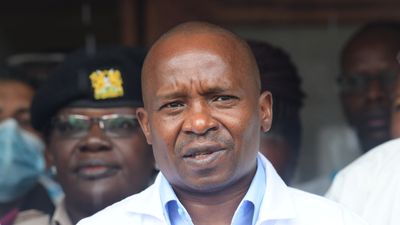Kenya Considering Banning TikTok for Government Officials
Interior Cabinet Secretary Kithure Kindiki appeared before a parliamentary committee to speak on TikTok’s local privacy compliance.
TikTok has been under intense global scrutiny, in the U.S. especially, where a House bill was passed over a week ago for the Chinese owner, ByteDance, to divest its American assets in six months or face a ban. Now, the same critical outlook is being applied by the Kenyan government, as it’s considering banning the ultra-popular social media app.
Speaking with a parliamentary committee earlier today, Interior Cabinet Secretary Kithure Kindiki said they’re closely looking at TikTok to see if it’s adhering to local privacy law. He said the National Security Council (NSC) is considering banning public officials from using the app, in order to protect sensitive data.
“We as the National Police Service (NPS) and the National Intelligence Service (NIS) are working with the Ministry of Defence and that of ICT to guard our cyberspace from internal and external threats,” Kindiki said to the Public Petitions Committee. Kenya currently does not have a policy on social media use, which means Kindiki and the government are looking to set up a new framework.
For now, the emphasis is on public office holders, citing steps being taken by other countries. “China, where TikTok originated, has banned the use of TikTok. In the U.S., 34 out of 54 states have prohibited government officers from using the TikTok app on their phones. Are Kenyan government officials not to have this app on their phones?” Kindiki asked rhetorically.
Highlighting some alleged negatives, the cabinet secretary said TikTok has been used by criminals to spread propaganda, commit identity theft and, “conduct fraud by duping Kenyans into fake forex trades and fake job recruitments.” In addition, Bob Ndolo, executive officer of Bridget Connect Consultancy, appeared before the committee to state that the popularity of TikTok is exposing young people to sexually explicit content, advocating for a total closure of TikTok’s operation in Kenya.
However, this proposed ban on TikTok is not the first time the app has come under the scrutiny of the Kenyan government. Last August, a statement from the presidency said that TikTok had agreed with the Kenyan government to moderate content shared on the platform in the country. Curiously, this was shortly after a round of anti-government protests were widely live-streamed on the app.
Kindiki has stated that the Kenyan government has reached out to TikTok, via the Data Protection Commissioner, to raise concerns about its processing activities. “The office has also required that TikTok implement additional Kenya-specific supplemental terms in its privacy policy considering the previous provisions of the [Data Protection Act 2019] and upon demonstration of the compliance, register with the office of the Data Commissioner as a data controller and/or data processor,” he stated.
TikTok has yet to reply to the Kenyan government and Kindiki has threatened that lack of an adequate, timely response will result in enforcement of the law, “through issuance of directives, orders and requirements."
- Ethiopia Restores Access to Facebook, TikTok, and More After Five-Month Blackout ›
- TikTok Commits to Establish Kenyan Office for Enhanced Content Moderation and African Operations ›
- Kenyan Parliament Considers Petition Urging Ban on TikTok ›
- Social Media Has Given African Youth a Voice but Some Governments are Shutting Them Down - Okayplayer ›
